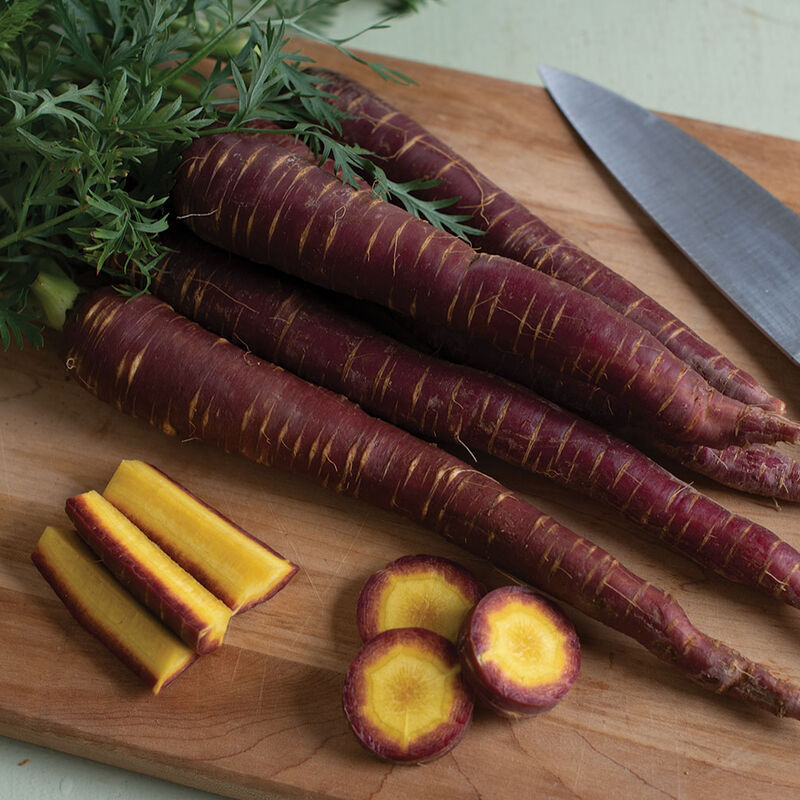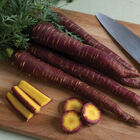Purple Elite (F1) Carrot Seed
Product ID:3385.113385
Purple Elite (F1) Carrot Seed
Product ID:3385.113385
Bright color and strong tops.
The rich purple skin contrasts nicely with its core and striations, which are both a beautiful yellow hue. Roots are 7–9" tapered. Tolerant to spring bolting. Imperator type. Also available with NOP-compliant pelleting.Specs:
- This product does not ship to the following countries: Australia, Japan, Republic of Korea, New Zealand, Taiwan.
SCIENTIFIC NAME:
Daucus carota var. sativusCULTURE:
Carrots require well-drained soils, with a pH range of 6.0-6.8. Deep, loose, and fertile sandy loams and peat soils with good moisture-holding capacity grow the straightest and smoothest roots.DAYS TO MATURITY: From date of direct seeding.DIRECT SEEDING: Sow from early spring to midsummer, 3/4–1" apart, 1/4– 1/2" deep, in a 2"-wide band (about 30 seeds/ft.), or single rows 16–24" apart. For minimum soil compaction, use raised beds with 2 or 3 rows 16–24" apart, beds 5–6' on center. Sprinkle the soil surface to keep moist. Do not allow soil to crust before the emergence of seedlings, which takes 1–3 weeks, depending on temperature and moisture. If necessary, thin young seedlings to 3/4–2" apart, depending on root size desired. Keep weed-free by tine weeding and shallow hoeing. To prevent greening, cover exposed crowns.AVG. DIRECT SEEDING RATE:
1 M/33', 5M/166', 25M/830', 720M/acre at 30 seeds/ft. in rows 24" apart.INSECT PESTS:
Carrot rust flies and wireworms: Provide fertile growing conditions and avoid ground recently in sod if possible. Exclude adult insects with fabric row covers.DISEASE: Blights can reduce yield and quality. Alternaria blight shows as brown-black lesions edged with yellow on leaf margins beginning on oldest leaves. Leaflets may shrivel and die. Cercospora blight first appears as small dark spots with yellow margins on the younger leaves and stems. To prevent blights, practice a 3-year crop rotation. Copper fungicides can be employed as a preventive measure or control.HARVEST:
Carrots may be dug any time after they reach the desired size. Generally the best harvest period lasts about 3 weeks (longer in cool, fall weather), after which time the roots may crack or the taste and appearance may decline. Make a few sowings at 3-week intervals for a continuous supply of tender carrots at their prime.STORAGE:
Plant carrots intended for winter storage about 100 days before expected fall frost. Carrots store best at 32°F (0°C) and 98% relative humidity.CARROT TYPES:
Each type is identified in product description. Amsterdam are short-season, medium-to-small, and cylindrical. Nantes are medium-length and cylindrical. The Shipping/Imperator types have the extra length and durability required of conventional packaged carrots, and perform best in deeply worked soil. Chantenays are top-shaped and suitable for shallow or heavy soil. Kuroda types have thick, tapered roots and can be darker than average in color. They are suitable for subtropical winter production (CA, TX, FL) or temperate summer production, where winters get below 45–50°F (7–13°C).SIZED SEEDS:
"Sized" seeds have been sorted so they are roughly the same size. This consistency allows for more accurate spacing with mechanical seeders and more even germination. Carrot seeds are sized, except when noted in the product description.SEEDS/LB.:
204,000–436,100 (avg. 294,900).PACKET:
750 seeds, sows 25'.Johnny's is committed to your success, every step of the way.
We want you, our customer, to be 100% satisfied with all of our seeds, tools, and supplies.
If anything you purchase from us proves unsatisfactory, we will either replace the item or refund the purchase price.




